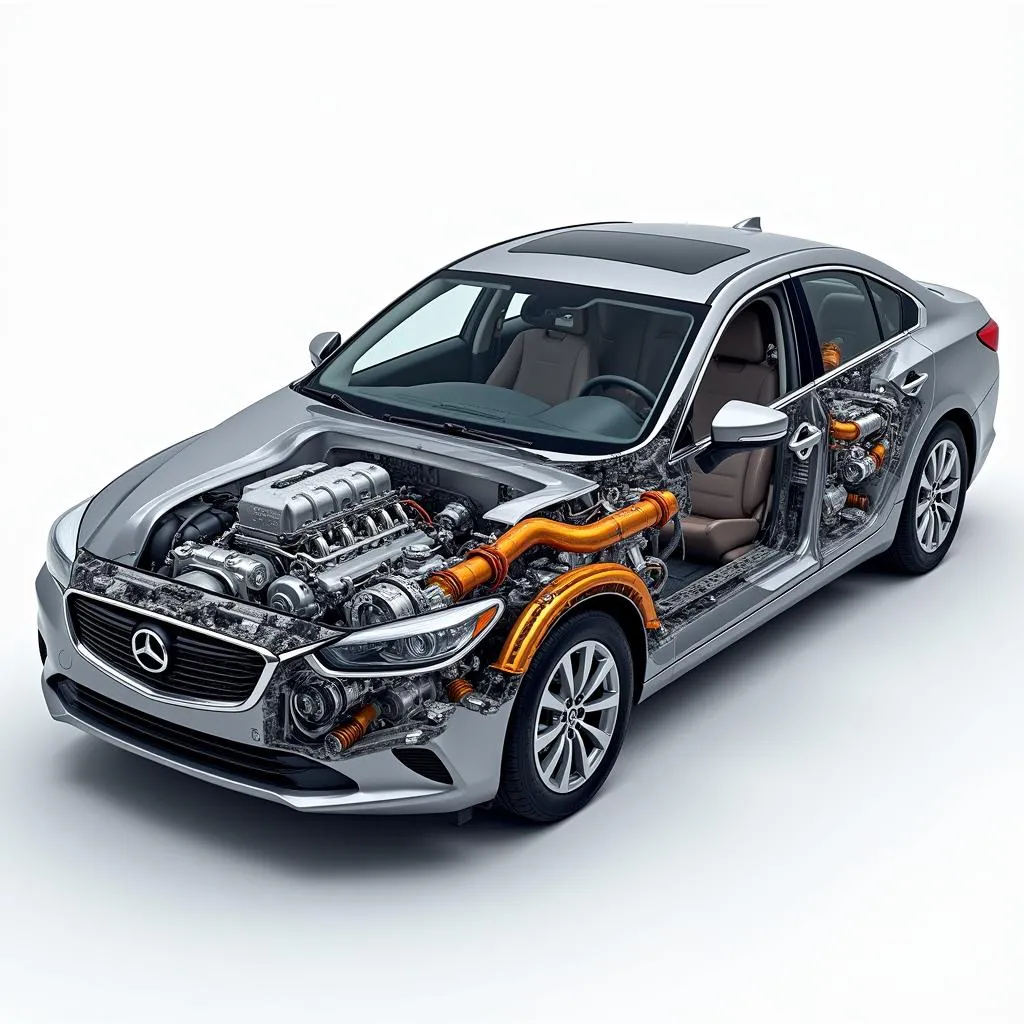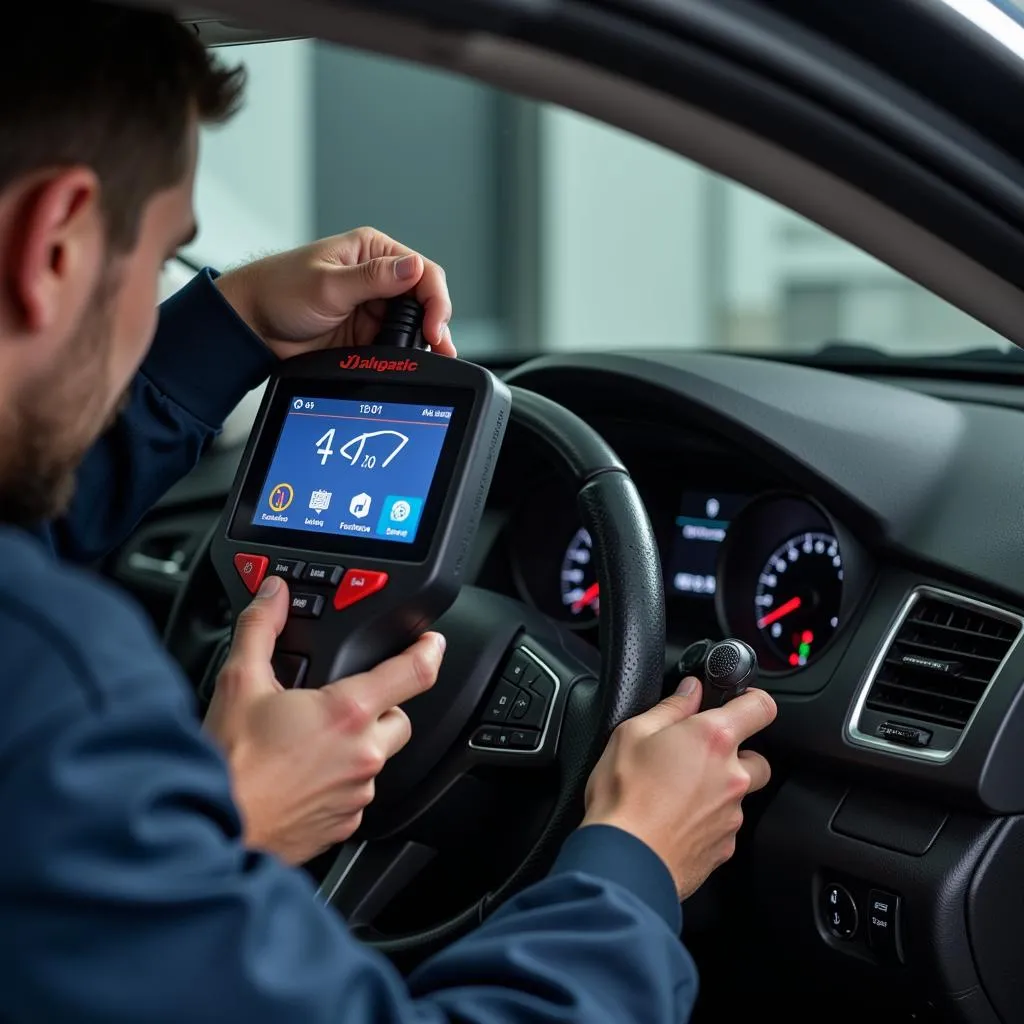A car’s ability to accelerate smoothly and efficiently is crucial for a safe and enjoyable driving experience. Whether you’re merging onto a highway or simply navigating city streets, understanding how your Car Accelerates and the common issues that can arise is essential. This comprehensive guide will delve into the intricacies of car acceleration, exploring the underlying mechanics and shedding light on potential problems that can hinder your vehicle’s performance.
The Science Behind Car Acceleration
At its core, car acceleration is the result of a complex interplay between various mechanical and electronic components working in perfect harmony. Here’s a breakdown of the key players:
- Engine: The heart of your car, the engine, generates the power needed for acceleration. It converts fuel into mechanical energy, which is then transferred to the wheels.
- Transmission: Acting as a gearbox, the transmission transmits the engine’s power to the wheels. It allows the engine to operate within its optimal power band by shifting gears.
- Drivetrain: The drivetrain encompasses all the components responsible for transferring power from the transmission to the wheels. This includes the driveshaft, differential, and axles.
- Wheels and Tires: The final link in the chain, the wheels and tires convert the rotational force from the drivetrain into linear motion, propelling your car forward.
When you press down on the accelerator pedal, you’re essentially signaling the engine to increase the rate at which it burns fuel. This, in turn, generates more power, which is transferred through the transmission, drivetrain, and ultimately to the wheels, resulting in acceleration.
 Car Engine and Transmission
Car Engine and Transmission
Factors Affecting Car Acceleration
Several factors can influence your car’s acceleration capabilities, including:
- Engine Size and Power: Larger, more powerful engines generally provide quicker acceleration.
- Transmission Type: Automatic transmissions offer convenience, while manual transmissions often provide better control over acceleration.
- Vehicle Weight: Heavier vehicles require more power to accelerate at the same rate as lighter ones.
- Aerodynamics: The shape and design of your car can affect its drag coefficient, influencing its acceleration.
- Road Conditions: Traction plays a vital role in acceleration, with dry, paved surfaces offering optimal grip.
Common Car Acceleration Problems
Experiencing issues with your car’s acceleration can be frustrating and potentially dangerous. Here are some common problems to watch out for:
- Slow Acceleration: This can be caused by a variety of factors, including a clogged air filter, dirty fuel injectors, or a failing fuel pump.
- Hesitation or Stuttering: If your car hesitates or stutters when you accelerate, it could be a sign of a faulty spark plug, ignition coil, or mass airflow sensor.
- Surging: Unintended acceleration, known as surging, can be caused by a malfunctioning throttle position sensor or cruise control system.
- Transmission Slipping: If your engine revs high but your car doesn’t accelerate accordingly, it could indicate a slipping transmission, often accompanied by a burning smell.
 Car Diagnostic Scanner
Car Diagnostic Scanner
Troubleshooting Car Acceleration Issues
If you’re experiencing car acceleration problems, it’s crucial to diagnose and address them promptly. Here are some steps you can take:
- Check Engine Light: If the check engine light is illuminated, it’s essential to have your car’s onboard computer scanned for error codes, which can provide valuable clues about the underlying issue.
- Inspect Air Filter: A clogged air filter restricts airflow to the engine, hindering its performance. Replacing a dirty air filter is a simple yet effective maintenance task.
- Fuel System Inspection: Dirty fuel injectors or a failing fuel pump can disrupt the fuel delivery process, leading to acceleration problems. Consider having your fuel system professionally inspected and cleaned.
Maintaining Optimal Car Acceleration
Preventing car acceleration issues starts with proper vehicle maintenance. Here are some tips to keep your car running smoothly:
- Regular Oil Changes: Engine oil lubricates moving parts and prevents excessive wear and tear, ensuring optimal engine performance.
- Transmission Fluid Flush: Like engine oil, transmission fluid degrades over time. Regularly flushing and replacing the transmission fluid can help prevent costly repairs.
- Spark Plug Replacement: Worn-out spark plugs can cause misfires and hinder engine performance. Consult your owner’s manual for the recommended spark plug replacement interval.
Conclusion
Understanding how your car accelerates and recognizing potential problems is vital for a safe and enjoyable driving experience. By following the tips outlined in this guide and addressing issues promptly, you can ensure your vehicle continues to perform at its best. Remember, regular maintenance is key to preventing costly repairs and prolonging the life of your car.
FAQ
Q: Why does my car accelerate slowly uphill?
A: Uphill driving requires more power from your engine. If your car struggles uphill, it could be due to a variety of factors, including a weak engine, a heavy load, or a transmission problem.
Q: Can a bad battery affect car acceleration?
A: While a bad battery might prevent your car from starting, it doesn’t directly impact acceleration. However, a failing alternator, which charges the battery, can lead to electrical issues that may affect engine performance.
Q: How often should I have my car serviced for optimal acceleration?
A: It’s generally recommended to follow the maintenance schedule outlined in your car’s owner’s manual. Regular servicing, including oil changes, air filter replacements, and spark plug replacements, can help maintain optimal engine performance and acceleration.
Q: What should I do if my car suddenly loses power while driving?
A: If your car suddenly loses power while driving, it’s crucial to remain calm, safely steer your vehicle to the side of the road, and turn on your hazard lights. It’s best to contact a tow truck and avoid driving the car until the underlying issue is diagnosed and repaired.
Q: Can driving habits affect car acceleration?
A: Yes, aggressive driving habits, such as rapid acceleration and hard braking, can put unnecessary strain on your car’s engine and transmission, potentially leading to premature wear and tear.
Still Have Questions?
If you have any further questions about car acceleration or any other automotive concerns, our team of experts is here to help!
Contact us via WhatsApp at +1(641)206-8880 or email us at [email protected]. You can also visit us at 276 Reock St, City of Orange, NJ 07050, United States. Our dedicated customer support team is available 24/7 to assist you.
For more helpful articles and resources on car maintenance and repair, be sure to check out our other blog posts, such as what causes car battery terminal corrosion and hit a skunk with car.
